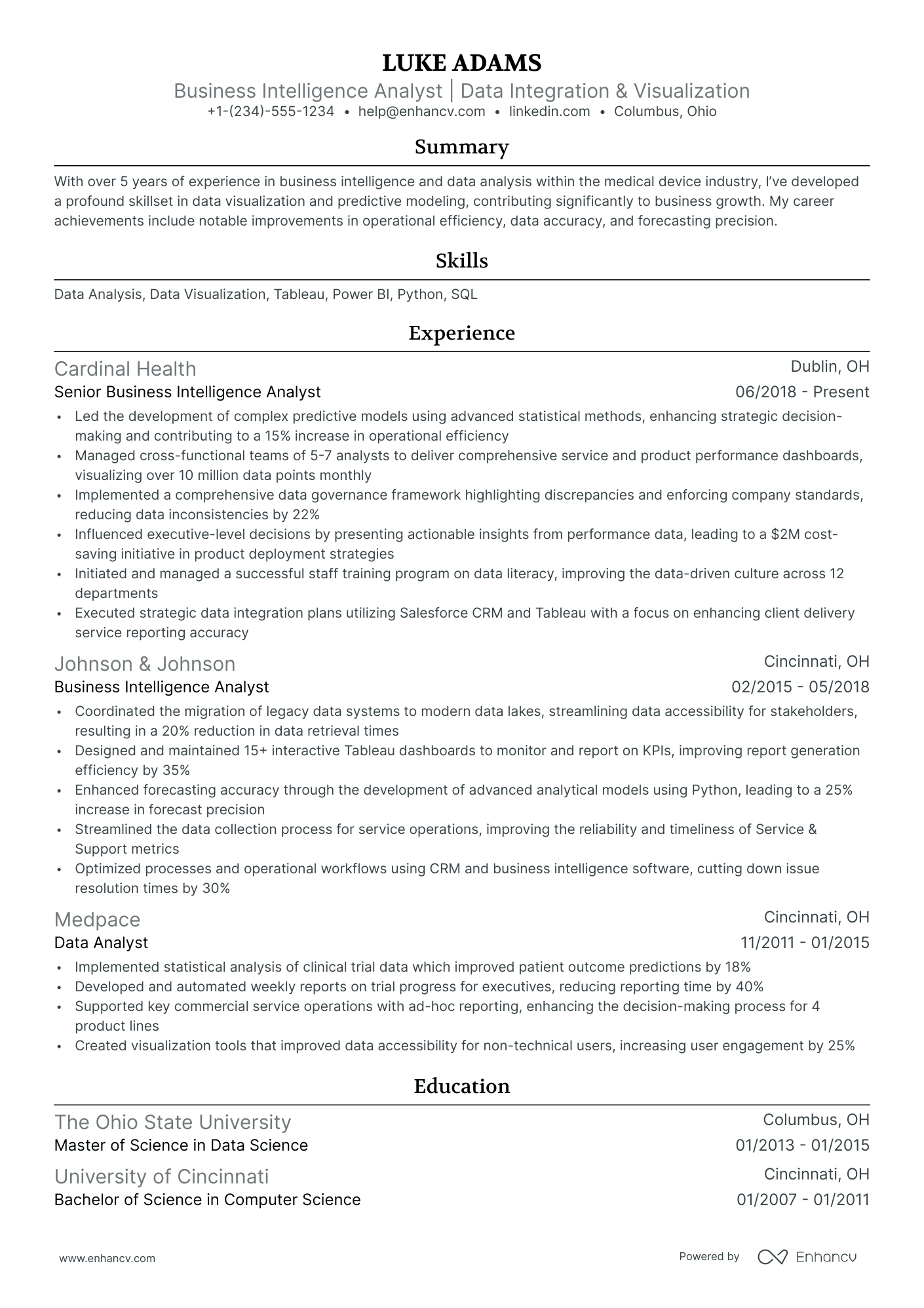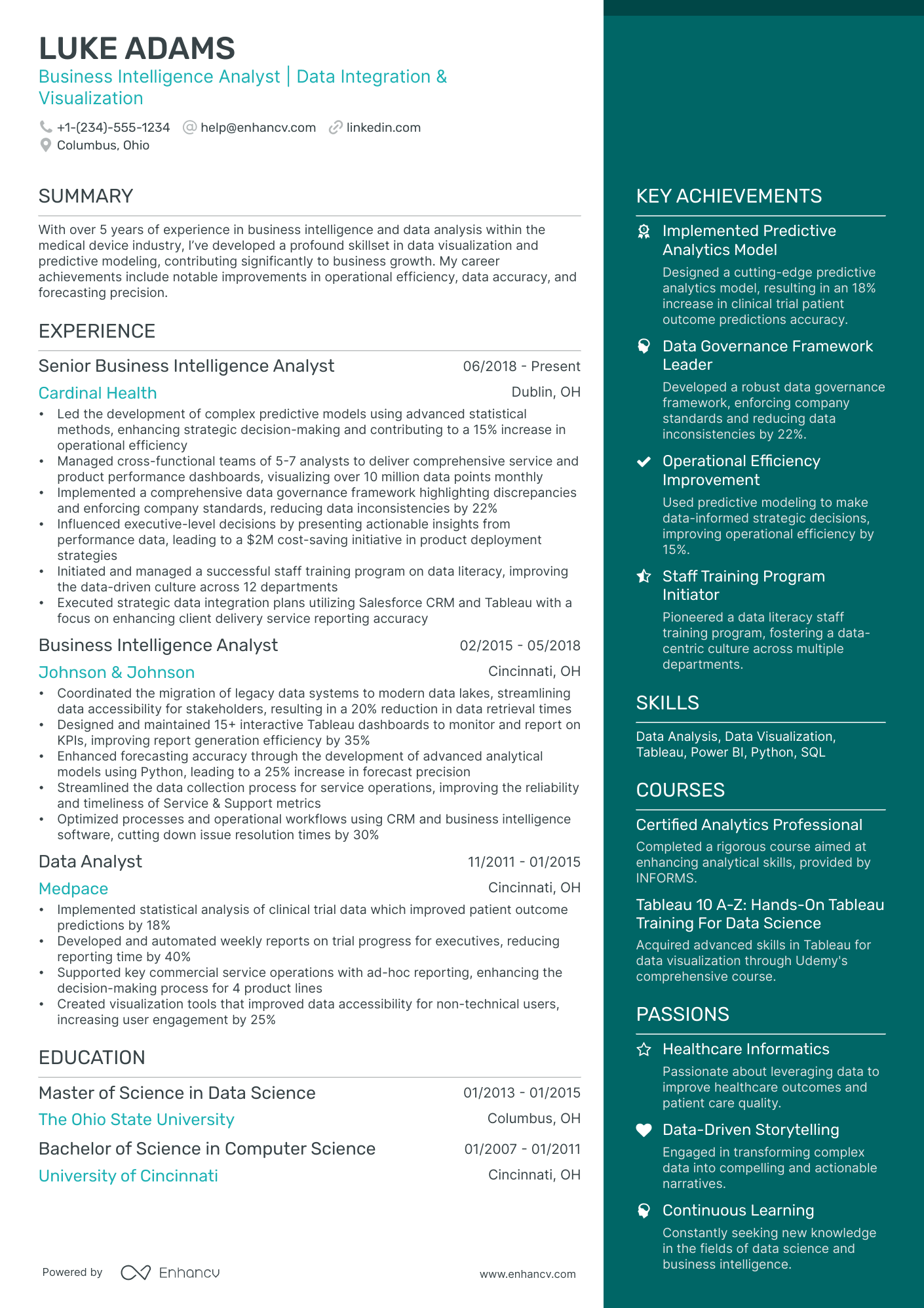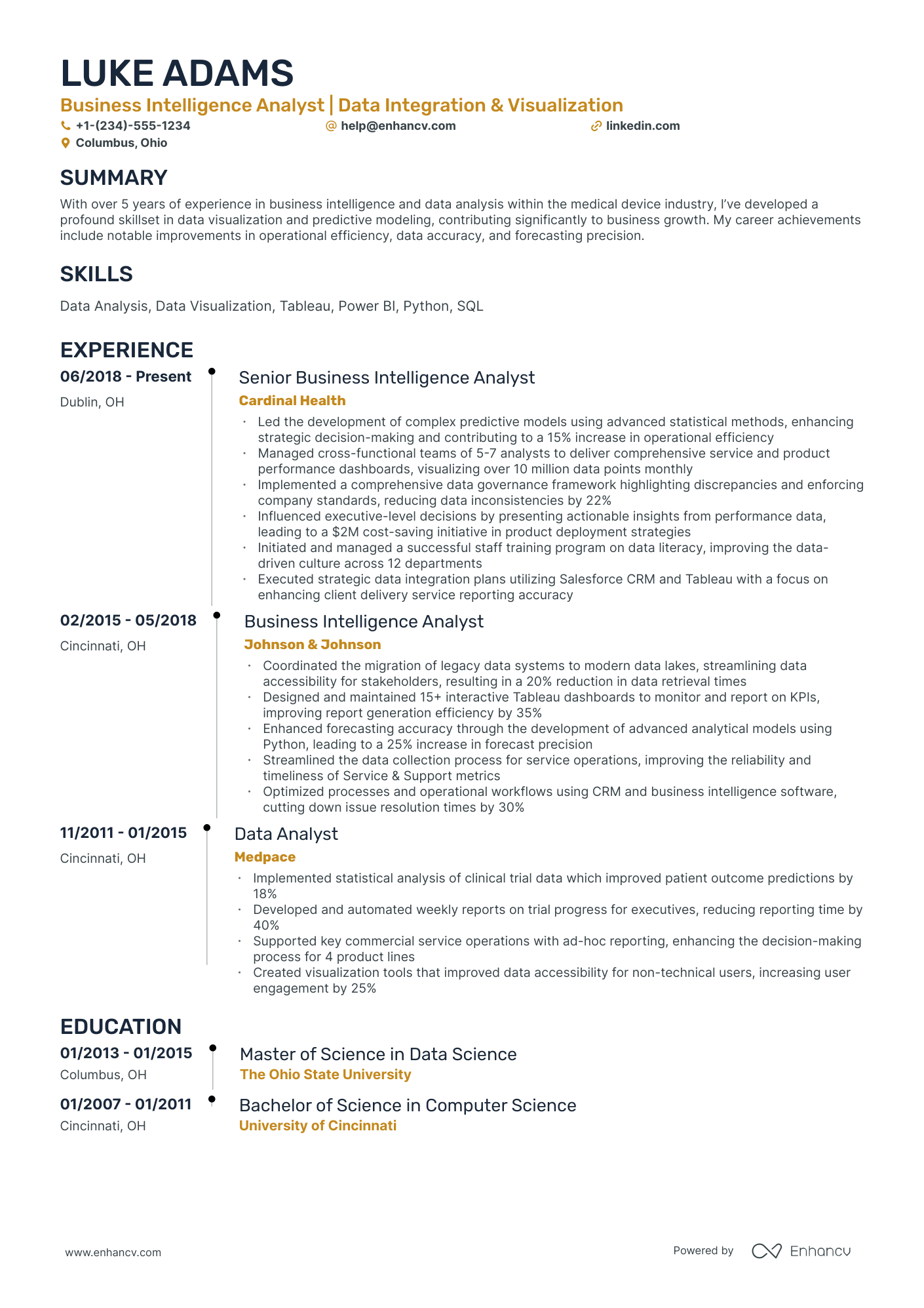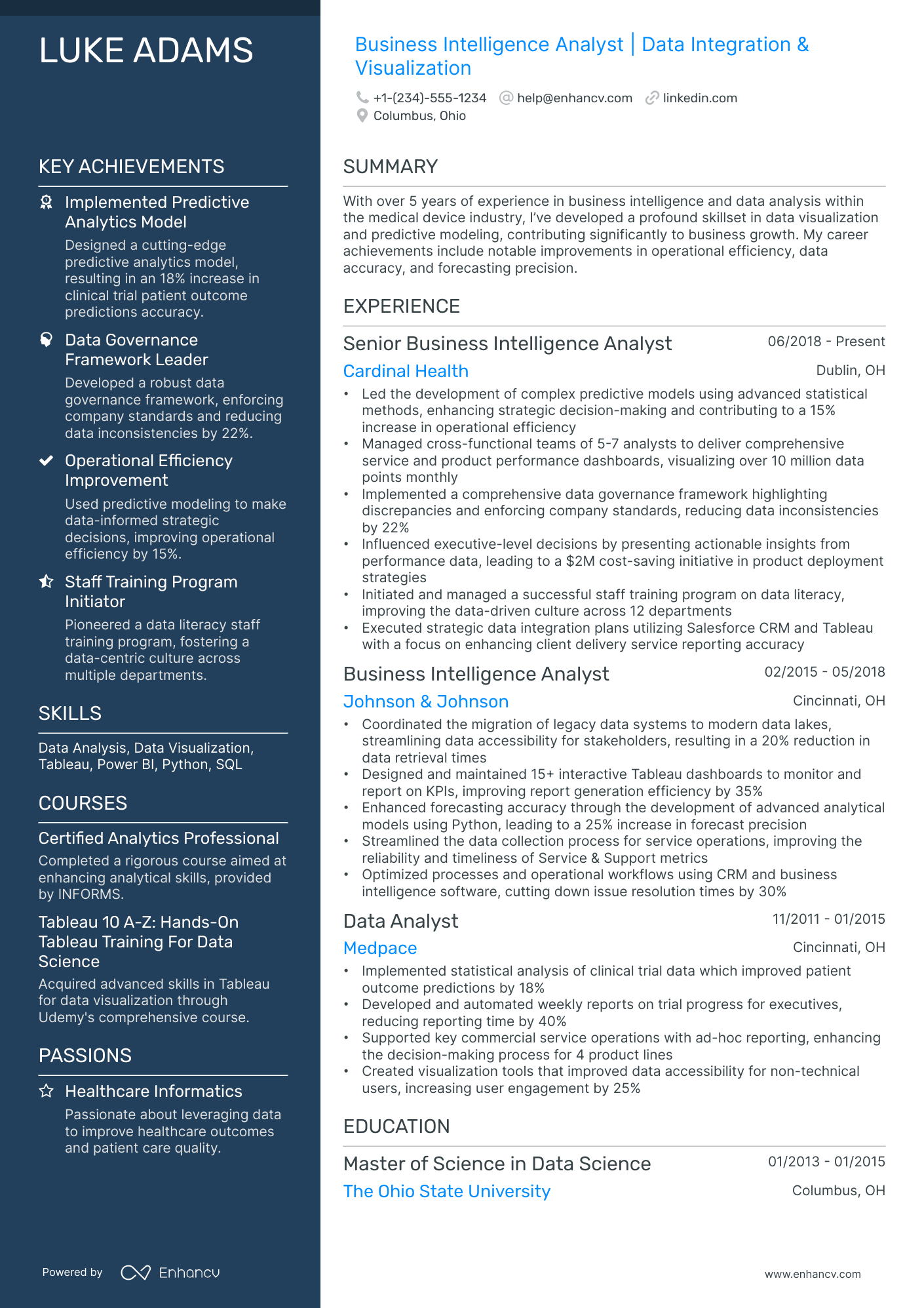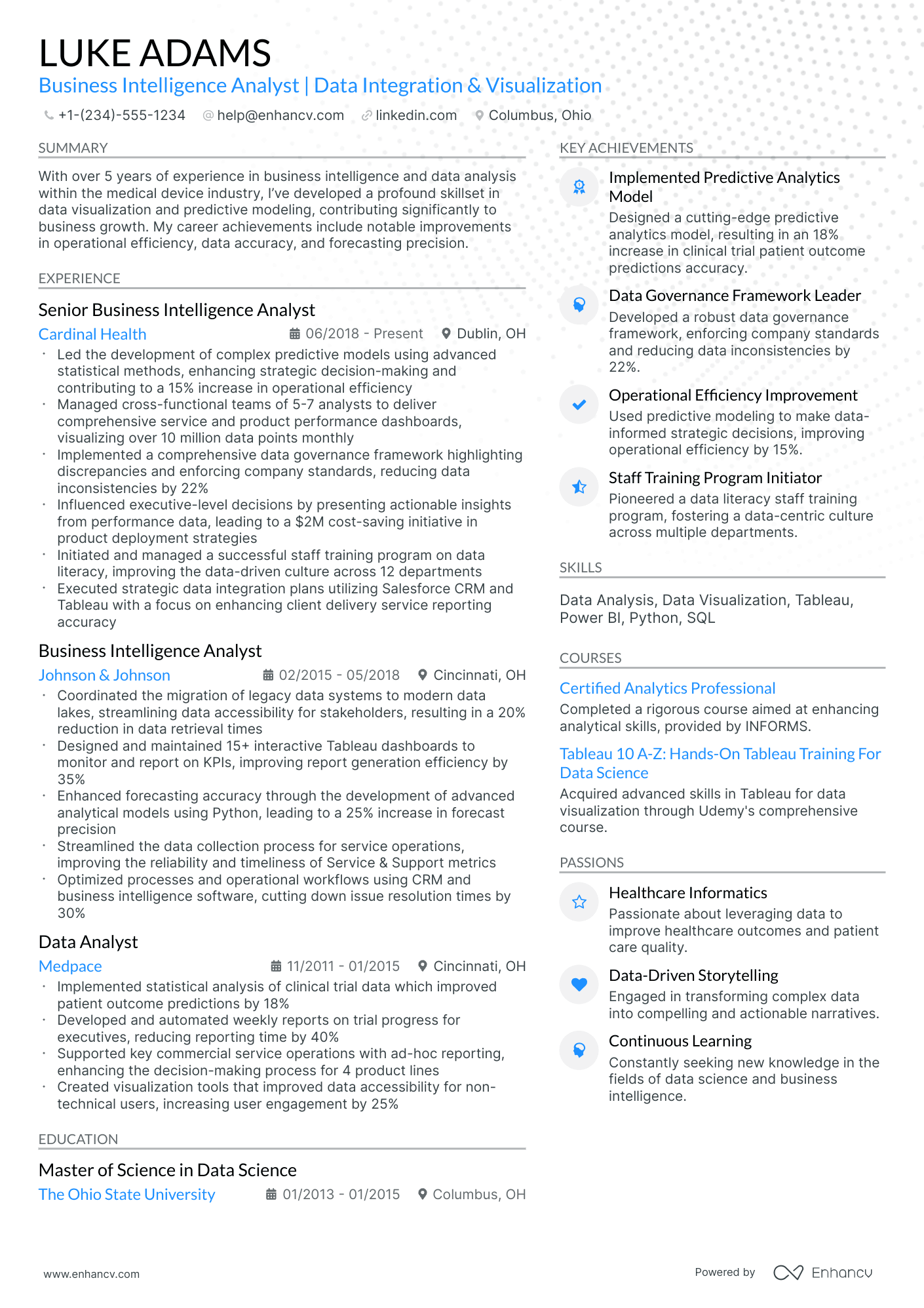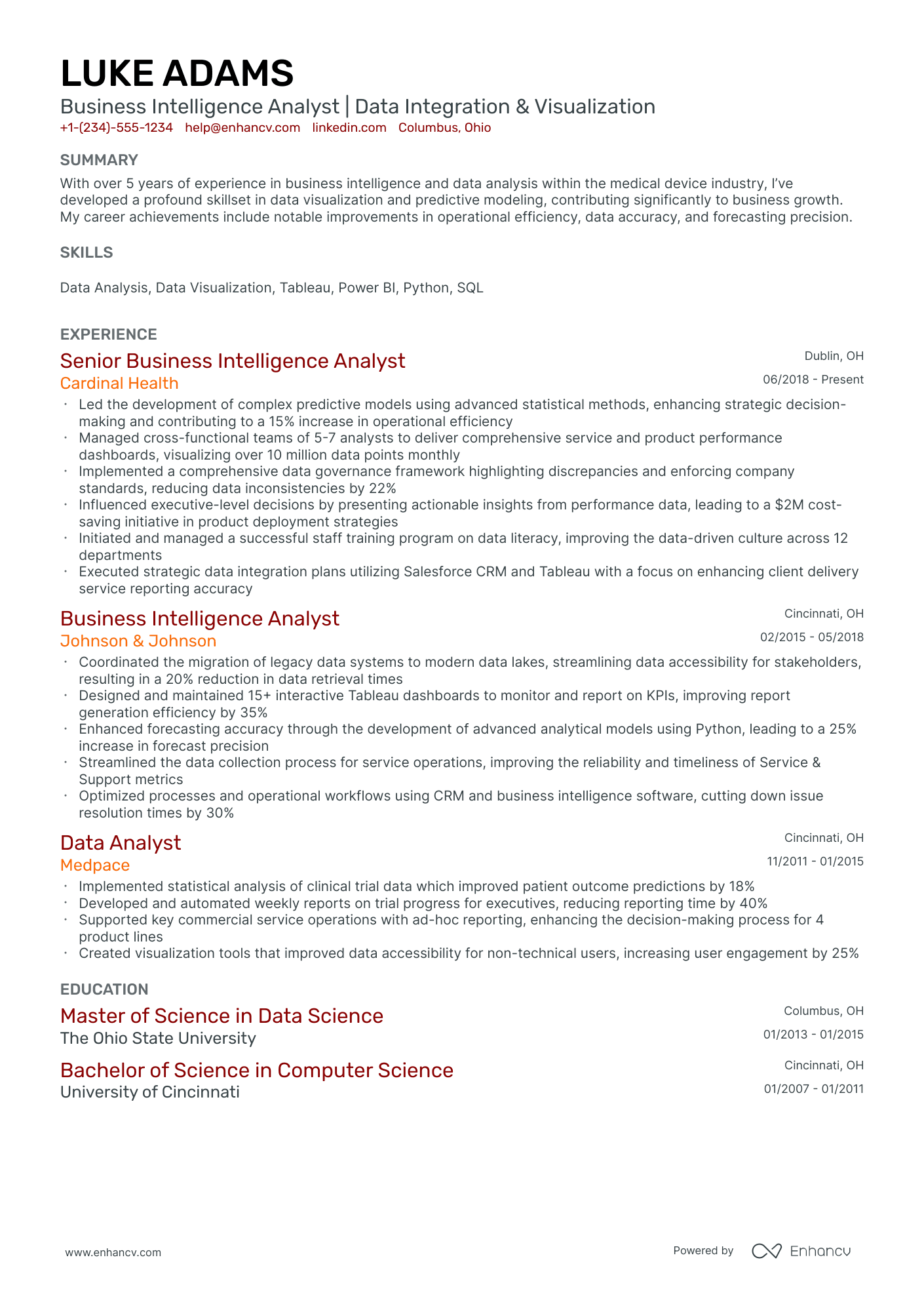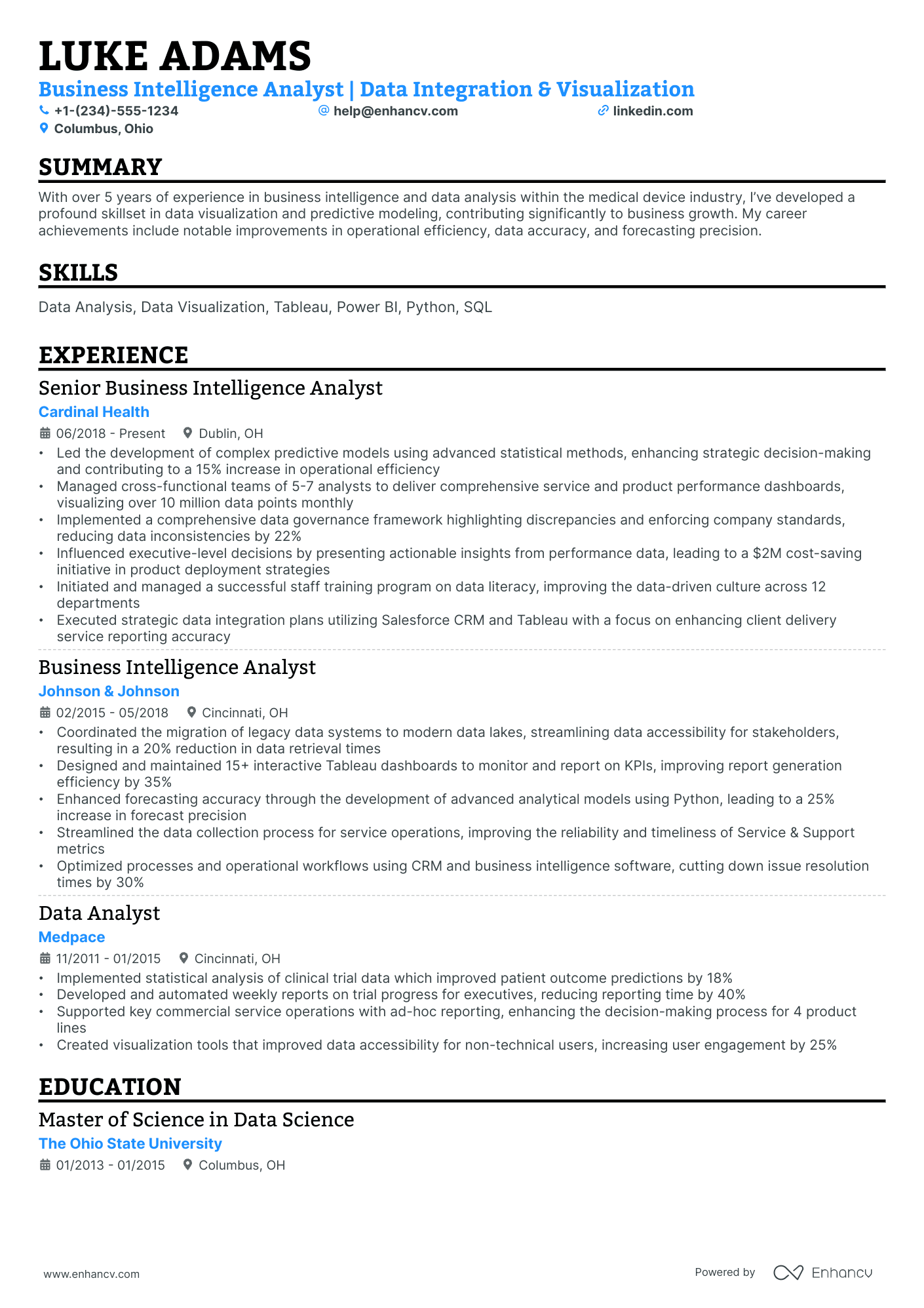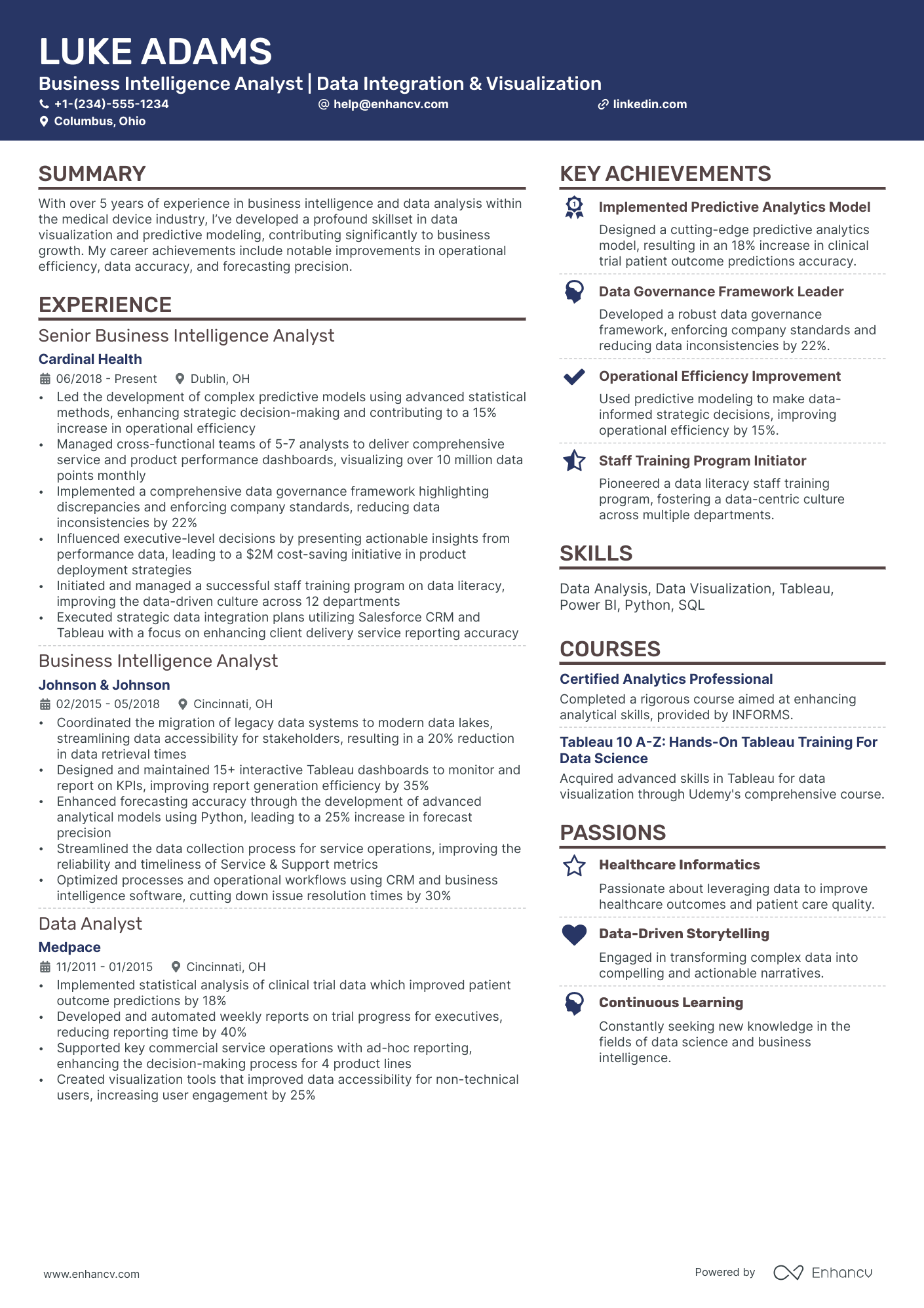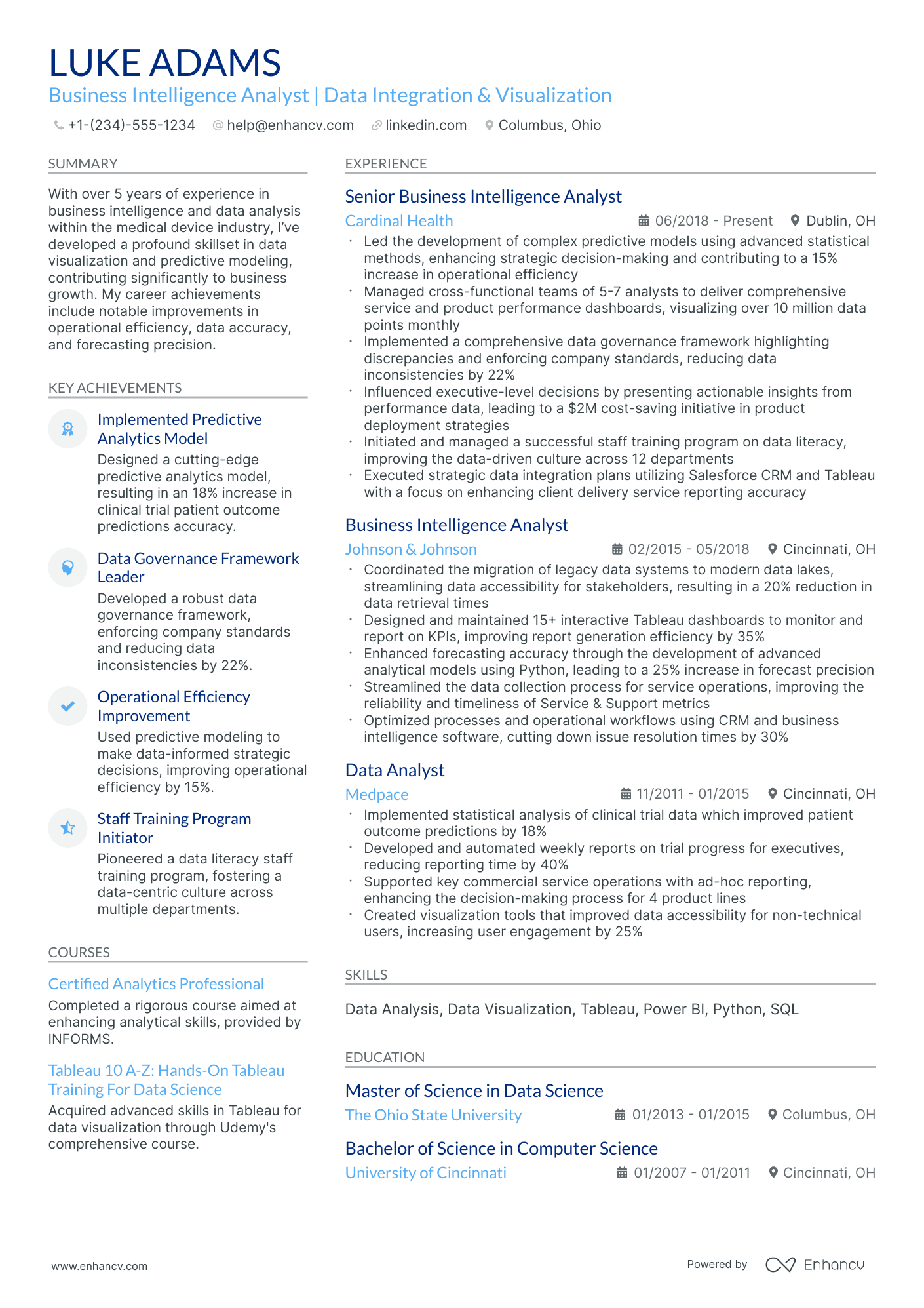As a senior business analyst, you may struggle with condensing a wealth of experience into a two-page resume that stands out. Our guide is specifically designed to help you highlight your key achievements and tailor your extensive skill set to the job at hand, ensuring your resume makes a lasting impression.
- Format your senior business analyst resume to ensure that it balances professionalism with creativity, and follows the best practices.
- Match the senior business analyst job requirements by including industry keywords on your resume.
- Use various resume sections to showcase your skills and achievements to answer why you're the best candidate for the senior business analyst role.
Take inspiration from leading senior business analyst resume examples to learn how to tailor your experience.
Enhancing your senior business analyst resume: format and layout tips
"Less is more" - this principle is key for your senior business analyst resume design. It emphasizes the importance of focusing on why you're the ideal candidate. Simultaneously, it's crucial to select a resume design that is both clear and simple, ensuring your qualifications are easily readable.
Four popular formatting rules (and an additional tip) are here to optimize your senior business analyst resume:
- Listing experience in reverse chronological order - start with your most recent job experiences. This layout helps recruiters see your career progression and emphasizes your most relevant roles.
- Including contact details in the header - make sure your contact information is easily accessible at the top of your resume. In the header, you might also include a professional photo.
- Aligning your expertise with the job requirements - this involves adding essential sections such as experience, skills, and education that match the job you're applying for.
- Curating your expertise on a single page - if your experience spans over a decade, a two-page resume is also acceptable.
Bonus tip: Ensure your senior business analyst resume is in PDF format when submitting. This format maintains the integrity of images, icons, and layout, making your resume easier to share.
Finally, concerning your resume format and the Applicant Tracker System (ATS):
- Use simple yet modern fonts like Rubik, Lato, Montserrat, etc.
- All serif and sans-serif fonts are friendly to ATS systems. Avoid script fonts that look like handwriting, however.
- Fonts such as Ariel and Times New Roman are suitable, though commonly used.
- Both single and double-column resumes can perform well with the ATS.
Different markets have specific resume formats – a Canadian resume could vary in layout.
Upload & Check Your Resume
Drop your resume here or choose a file. PDF & DOCX only. Max 2MB file size.
PRO TIP
The more trusted the organization you've attained your certificate (or degree) from, the more credible your skill set would be.
Don't forget to include these six sections on your senior business analyst resume:
- Header and summary for your contact details and to highlight your alignment with the senior business analyst job you're applying for
- Experience section to get into specific technologies you're apt at using and personal skills to deliver successful results
- Skills section to further highlight how your profile matches the job requirements
- Education section to provide your academic background
- Achievements to mention any career highlights that may be impressive, or that you might have missed so far in other resume sections
What recruiters want to see on your resume:
- Proficiency in data analysis tools (e.g., SQL, Excel, Tableau, Power BI) and experience with business intelligence software.
- Strong understanding of business processes, requirements gathering, and the ability to translate business needs into technical specifications.
- Demonstrated experience in project management and leading cross-functional projects to successful completion.
- A track record of identifying business trends, forecasting, and performing advanced data analytics to drive business decisions.
- Effective communication and stakeholder management skills, with examples of facilitating workshops and presenting findings to senior management.
Quick formula for writing your senior business analyst resume experience section
Have you ever wondered why recruiters care about your senior business analyst expertise?
For starters, your past roles show that you've obtained the relevant on-the job training and expertise that'd be useful for the role.
What is more, the resume work experience section isn't just your work history , but:
- shows what you're capable of achieving based on your past success;
- proves your skills with (oftentimes, tangible) achievements;
- highlights the unique value of what it's like to work with you.
To ensure your resume work experience section is as effective as possible, follow this formula:
- start each bullet with a powerful, action verb , followed up by your responsibilities, and your workplace success.
The more details you can include - that are relevant to the job and linked with your skill set - the more likely you are to catch recruiters' attention.
Additionally, you can also scan the job advert for key requirements or buzzwords , which you can quantify across your experience section.
Not sure what we mean by this? Take inspiration from the senior business analyst resume experience sections below:
- Led the cross-functional team in the deployment of a new CRM system, improving customer interaction tracking by 35%.
- Conducted detailed market analysis to inform senior management of potential investment opportunities, influencing a shift in strategic direction.
- Developed complex financial models to forecast sales performance across multiple product lines, increasing accuracy of sales projections by 25%.
- Managed a portfolio of business critical projects, coordinating between departments to ensure seamless implementation and adherence to timelines.
- Performed comprehensive data analysis to identify cost-saving opportunities, reducing operational expenses by $1.2 million annually.
- Facilitated stakeholder workshops to gather business requirements, effectively translating them into actionable technical specifications.
- Orchestrated the digital transformation initiative, which led to a 40% increase in process efficiency through automation.
- Conducted risk analysis for key business decisions, decreasing the likelihood of project failure and protecting revenue streams.
- Designed and implemented analytical reports to track performance metrics, leading to a 15% improvement in decision-making speed for upper management.
- Collaborated with IT and finance to develop an enterprise-wide budget tracking system, enhancing fiscal accountability and visibility.
- Streamlined data collection processes across multiple departments, enabling a more robust and real-time analysis of company operations.
- Mentored junior analysts, enhancing the overall skill level of the department and improving team output by 20%.
- Spearheaded the post-merger integration of business systems, ensuring a cohesive transition and maintaining uninterrupted business operations.
- Evaluated new software tools and provided recommendations that resulted in a more streamlined workflow and a 25% cost reduction.
- Analyzed customer feedback to align product development with user demand, contributing to a 10% increase in customer satisfaction.
- Implemented a new BI solution to provide real-time insights into sales data, boosting sales team performance by 30%.
- Enhanced reporting capabilities which allowed for a more granular view of financial metrics and operational KPIs, facilitating better strategic planning.
- Initiated a company-wide process optimization project which led to the reduction of cycle times by 15%.
- Drove an analytics initiative that uncovered revenue leakage, leading to the recovery of $800,000 in annual profits.
- Provided in-depth analysis for go-to-market strategies for new product launches, which increased market penetration by 12% within the first year.
- Defined and streamlined business processes to improve operational efficiency, resulting in a 20% reduction in overhead costs.
- Managed a business intelligence initiative that consolidated disparate data sources into a central repository, reducing reporting times by 50%.
- Optimized supply chain logistics by implementing a new forecasting model, improving inventory turnover by 18%.
- Coordinated with product teams to integrate customer usage data into product design, driving a user-centric update strategy.
- Revamped the client reporting system to provide more actionable insights, enabling a 20% increase in client retention.
- Led a cross-departmental effort to develop a new performance metric system, aligning employee incentives with company goals.
- Facilitated the transition to an agile project management methodology, shortening delivery timelines by an average of 4 weeks.
- Initiated a market segmentation analysis that helped redefine sales territories and resulted in a 7% increase in sales efficiency.
- Developed training programs for new analytical tools, raising the competency level of the analytics team by 30%.
- Crafted regulatory compliance monitoring protocols, mitigating risk and avoiding potential fines totaling over $500,000.
Quantifying impact on your resume
- Include the size of the budgets you have managed to demonstrate your financial oversight capabilities.
- List the percentage of cost reduction you achieved in projects to show your efficiency in cutting expenses.
- Mention the dollar value of the revenue streams you identified or grew to exhibit your contribution to top-line growth.
- Detail the number of cross-functional teams you led or collaborated with to highlight your leadership and teamwork skills.
- Present the quantitative improvements in process efficiency, such as reduced cycle time, to underscore your operational impact.
- Specify the number of strategic initiatives you have developed or executed to show your involvement in high-level decision-making.
- Quantify the scale of data analysis or data sets you have worked with to emphasize your analytical abilities.
- Feature the percentage increase in customer satisfaction or market share to illustrate your focus on customer-centric outcomes.
Action verbs for your senior business analyst resume
Four quick steps for candidates with no resume experience
Those with less or no relevant experience could also make a good impression on recruiters by:
- Taking the time to actually understand what matters most to the role and featuring this within key sections of their resume
- Investing resume space into defining what makes them a valuable candidate with transferrable skills and personality
- Using the resume objective to showcase their personal vision for growth within the company
- Heavily featuring their technical alignment with relevant certifications, education, and skills.
Remember that your resume is about aligning your profile to that of the ideal candidate.
The more prominently you can demonstrate how you answer job requirements, the more likely you'd be called in for an interview.
Recommended reads:
PRO TIP
Always remember that your senior business analyst certifications can be quantified across different resume sections, like your experience, summary, or objective. For example, you could include concise details within the expertise bullets of how the specific certificate has improved your on-the-job performance.
Key hard skills and soft skills for your senior business analyst resume
At the top of any recruiter senior business analyst checklist, you'd discover a list of technical competencies, balanced with personal skills.
Hard or technical skills are your opportunity to show how you meet the essential responsibilities of the role. The ability to use a particular job-crucial technology or software would also hint to recruiters whether you'd need a prolonged period of on-the-job training - or you'd fit right in the job.
But to land your dream role, you'd also need to demonstrate a variety of soft or people resume skills . Employers care about soft skills as they show how each candidate would fit into the team and company culture.
Both types of skills are specific and to best curate them on your resume, you'd need to:
- Create a skill section within which you showcase your hard and soft skills and present how they help you succeed.
- List specific examples of projects, tasks, or competitions, within which your skill set has assisted your results.
- Soft skills are harder to measure, so think about situations in which they've helped you thrive. Describe those situations concisely, focusing on how the outcome has helped you grow as a professional.
- Metrics of success - like positive ROI or optimized workplace processes - are the best way to prove your technical and people skills.
Take a look at some of senior business analyst industry leaders' favorite hard skills and soft skills, as listed on their resumes.
Top skills for your senior business analyst resume:
SQL
Data Visualization (Tableau, Power BI)
Business Process Modeling
Requirements Gathering
Agile Methodologies (Scrum, Kanban)
Project Management Tools (JIRA, Trello)
Statistical Analysis Software (R, Python)
ERP Systems (SAP, Oracle)
User Experience (UX) Design Principles
Microsoft Excel Advanced Functions
Communication Skills
Problem-Solving
Critical Thinking
Stakeholder Management
Adaptability
Team Collaboration
Time Management
Negotiation Skills
Conflict Resolution
Attention to Detail
PRO TIP
List all your relevant higher education degrees within your resume in reverse chronological order (starting with the latest). There are cases when your PhD in a particular field could help you stand apart from other candidates.
Maximizing your senior business analyst resume: education and certification sections
To effectively showcase your industry knowledge in your senior business analyst resume, it's important to properly list your education and certifications.
For the education section, ensure you include:
- Higher education degrees pertinent to the industry or those at a postgraduate level;
- The start and end dates of your education, along with the name of the institution you graduated from;
- Your GPA and relevant coursework, but only if they are impressive and applicable to the role.
Additionally, create a separate certifications section to spotlight your most notable recognitions. Another excellent place to feature a leading industry certificate is in your resume header, right after your name.
Below is a list of key industry certifications that are often sought after by recruiters
The top 5 certifications for your senior business analyst resume:
- Certified Business Analysis Professional (CBAP) - International Institute of Business Analysis (IIBA)
- PMI Professional in Business Analysis (PMI-PBA) - Project Management Institute (PMI)
- Agile Analysis Certification (IIBA-AAC) - International Institute of Business Analysis (IIBA)
- Certified Analytics Professional (CAP) - INFORMS
- Certification of Capability in Business Analysis (CCBA) - International Institute of Business Analysis (IIBA)
PRO TIP
Always remember that your senior business analyst certifications can be quantified across different resume sections, like your experience, summary, or objective. For example, you could include concise details within the expertise bullets of how the specific certificate has improved your on-the-job performance.
Recommended reads:
Writing the senior business analyst resume summary or objective: achievements, keywords, dreams, and more
Deciding on whether to include a resume summary or resume objective should entirely depend on your career situation.
If you have:
- Plenty of relevant achievements you'd like to bring recruiters' focus to, make use of the resume summary. Ensure each of your achievements is quantified with concrete proof (e.g. % of cases solved).
- Less applicable experience, utilize the resume objective. Within the objective include a few noteworthy, past successes, followed up by your professional dreams.
As a bonus, you could define in either your senior business analyst resume summary or objective what makes you the perfect candidate for the role.
Think about your unique hard and soft skills that would make your expertise even more important to the job.
These senior business analyst professionals have completely covered the formula for the ideal resume introduction:
Resume summaries for a senior business analyst job
- Seasoned Business Analyst with over 10 years of experience in finance and risk management, adept at SQL, Python, and Tableau. Instrumental in saving a Fortune 500 company $2M annually through process optimization. Seeking to leverage analytical expertise to drive strategic business decisions and revenue growth.
- Dynamic professional with a 15-year tenure in supply chain management, transitioning to Business Analysis. Proficient in predictive analytics and data visualization, with a track record of improving operational efficiency by 20%. Eager to apply transferable skills to uncover insights that enhance business performance.
- Accomplished IT Project Manager with 8 years' experience, pivoting to a Business Analyst role. Expert in Agile methodologies, proficient in leveraging big data to achieve project goals. Recognized for leading a multi-disciplinary team to deliver a high-profile digital transformation project on time and under budget.
- With over 12 years' experience in market research and data analysis, I have developed a keen ability to interpret complex data sets and translate them into actionable business strategies. Recognized for designing an analytics program that increased market share by 15% within the first year.
- As a newcomer to the field of Business Analysis, I am driven to develop my skills in data interpretation, strategic planning, and project management. Armed with a Master's degree in Business Administration and a certification in Business Analysis, my objective is to contribute fresh perspectives and enthusiastic problem-solving to a dynamic team.
- Fresh MBA graduate eager to embark on a career as a Business Analyst, with hands-on internship experience in business process mapping and optimization. Adept at identifying trends and developing insights using BI tools like Power BI and Excel. I aim to utilize my academic background and new knowledge to facilitate data-driven decisions.
Optimize your resume summary and objective for ATS
Drop your resume here or choose a file.
PDF & DOCX only. Max 2MB file size.
Other relevant sections for your senior business analyst resume
Apart from the standard senior business analyst resume sections listed in this guide, you have the opportunity to get creative with building your profile. Select additional resume sections that you deem align with the role, department, or company culture. Good choices for your senior business analyst resume include:
- Language skills - always ensure that you have qualified each language you speak according to relevant frameworks;
- Hobbies - you could share more about your favorite books, how you spend your time, etc. ;
- Volunteering - to highlight the causes you care about;
- Awards - for your most prominent senior business analyst professional accolades and achievements.
Make sure that these sections don't take too much away from your experience, but instead build up your senior business analyst professional profile.
Key takeaways
At the end of our guide, we'd like to remind you to:
- Invest in a simple, modern resume design that is ATS friendly and keeps your experience organized and legible;
- Avoid just listing your responsibilities in your experience section, but rather focus on quantifiable achievements;
- Always select resume sections that are relevant to the role and can answer job requirements. Sometimes your volunteering experience could bring more value than irrelevant work experience;
- Balance your technical background with your personality traits across various sections of your resume to hint at how much time employers would have to invest in training you and if your profile would be a good cultural fit to the organization;
- Include your academic background (in the form of your relevant higher education degrees and certifications) to show recruiters that you have the technical basics of the industry covered.
